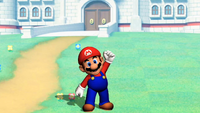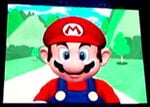Mario in Real Time: Difference between revisions
No edit summary |
No edit summary |
||
| Line 1: | Line 1: | ||
[[File:ANewMirtHQ.png|thumb|Charles as Mario, in most recent interation of Mario in Real Time]] | [[File:ANewMirtHQ.png|thumb|Charles as Mario, in most recent interation of Mario in Real Time]] | ||
'''[[Mario]] in Real Time''' (more commonly known as '''MIRT''') is an interactive system developed by SimGraphics and introduced in 1991<ref>https://twitter.com/CharlesMartinet/status/1493266234644779012?s=09</ref><ref>https://www.mariowiki.com/File:Coyleinfo1.png</ref>, and has since been used by [[Nintendo]] in various {{wp|trade fair}}s. Thought up by {{wp|Minoru Arakawa}}, MIRT is notable for | '''[[Mario]] in Real Time''' (more commonly known as '''MIRT''') is an interactive system developed by SimGraphics and introduced in 1991<ref>https://twitter.com/CharlesMartinet/status/1493266234644779012?s=09</ref><ref>https://www.mariowiki.com/File:Coyleinfo1.png</ref>, and has since been used by [[Nintendo]] in various {{wp|trade fair}}s. Thought up by {{wp|Minoru Arakawa}}, MIRT is notable for being [[Charles Martinet]]'s first role as Mario (prior to his video game debut in ''[[Mario Teaches Typing]]''). | ||
MIRT displays Mario on a screen, through which he can talk to those attending the trade fair. Charles Martinet himself (with substitute Stevie Coyle)<ref name="SCES"/> works the device, standing out of view and reciting Mario's lines, which are instantly reiterated by the hero. Martinet also provides Mario's movement through sensors courtesy of [http://www.manta.com/coms2/dnbcompany_jqmh38 Simgraphics Engineering], who developed the '''VActor''' technology on which MIRT works. (''[[Mario (franchise)|Mario]]'' sound effects and various impossible movements are also available to Martinet.)<ref>n8phin (June 10, 2006). [https://web.archive.org/web/20071201111436/https://www.youtube.com/watch?v=AWfZjVbFFkc Mario's movie impressions at E3]. ''YouTube''. Archived from the original on November 4, 2007 via Wayback Machine.</ref> Although Martinet is hidden from the audience, he can see and hear them through a hidden camera and microphone. In addition to trade shows, an early Mario in Real Time was used to animate [[Mario's face]] in ''[[Mario Teaches Typing]]'' and [[Mario Teaches Typing 2|its sequel]]. | MIRT displays Mario on a screen, through which he can talk to those attending the trade fair. Charles Martinet himself (with substitute Stevie Coyle)<ref name="SCES"/> works the device, standing out of view and reciting Mario's lines, which are instantly reiterated by the hero. Martinet also provides Mario's movement through sensors courtesy of [http://www.manta.com/coms2/dnbcompany_jqmh38 Simgraphics Engineering], who developed the '''VActor''' technology on which MIRT works. (''[[Mario (franchise)|Mario]]'' sound effects and various impossible movements are also available to Martinet.)<ref>n8phin (June 10, 2006). [https://web.archive.org/web/20071201111436/https://www.youtube.com/watch?v=AWfZjVbFFkc Mario's movie impressions at E3]. ''YouTube''. Archived from the original on November 4, 2007 via Wayback Machine.</ref> Although Martinet is hidden from the audience, he can see and hear them through a hidden camera and microphone. In addition to trade shows, an early Mario in Real Time was used to animate [[Mario's face]] in ''[[Mario Teaches Typing]]'' and [[Mario Teaches Typing 2|its sequel]]. | ||
Revision as of 14:06, February 7, 2023
Mario in Real Time (more commonly known as MIRT) is an interactive system developed by SimGraphics and introduced in 1991[1][2], and has since been used by Nintendo in various trade fairs. Thought up by Minoru Arakawa, MIRT is notable for being Charles Martinet's first role as Mario (prior to his video game debut in Mario Teaches Typing).
MIRT displays Mario on a screen, through which he can talk to those attending the trade fair. Charles Martinet himself (with substitute Stevie Coyle)[3] works the device, standing out of view and reciting Mario's lines, which are instantly reiterated by the hero. Martinet also provides Mario's movement through sensors courtesy of Simgraphics Engineering, who developed the VActor technology on which MIRT works. (Mario sound effects and various impossible movements are also available to Martinet.)[4] Although Martinet is hidden from the audience, he can see and hear them through a hidden camera and microphone. In addition to trade shows, an early Mario in Real Time was used to animate Mario's face in Mario Teaches Typing and its sequel.
MIRT has been repeatedly used by Nintendo throughout the years for promotional events all the way up to present day, modern examples including San Diego Comic-Con 2012 and the Nintendo World Luigi's Mansion: Dark Moon launch event in New York in 2013 (the former having featured Martinet (as Mario) answering questions from fans,[5] while the latter involved Luigi welcoming fans to the Dark Moon launch event.[6]
Gallery
References
- ^ https://twitter.com/CharlesMartinet/status/1493266234644779012?s=09
- ^ https://www.mariowiki.com/File:Coyleinfo1.png
- ^ Cite error: Invalid
<ref>tag; no text was provided for refs namedSCES - ^ n8phin (June 10, 2006). Mario's movie impressions at E3. YouTube. Archived from the original on November 4, 2007 via Wayback Machine.
- ^ Patrick Scott Patterson (July 16, 2012). Mario reveals his last name & other tales - San Diego Comic Con 2012). YouTube. Retrieved May 8, 2016.
- ^ CubedLink (March 27, 2013). Luigi's welcome at the 'Luigi's Mansion: Dark Moon' Nintendo World launch. YouTube. Retrieved May 8, 2016.


